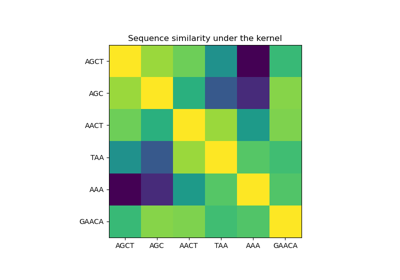Hyperparameter#
- class sklearn.gaussian_process.kernels.Hyperparameter(name, value_type, bounds, n_elements=1, fixed=None)[source]#
A kernel hyperparameter’s specification in form of a namedtuple.
Added in version 0.18.
- Attributes:
- namestr
The name of the hyperparameter. Note that a kernel using a hyperparameter with name “x” must have the attributes self.x and self.x_bounds
- value_typestr
The type of the hyperparameter. Currently, only “numeric” hyperparameters are supported.
- boundspair of floats >= 0 or “fixed”
The lower and upper bound on the parameter. If n_elements>1, a pair of 1d array with n_elements each may be given alternatively. If the string “fixed” is passed as bounds, the hyperparameter’s value cannot be changed.
- n_elementsint, default=1
The number of elements of the hyperparameter value. Defaults to 1, which corresponds to a scalar hyperparameter. n_elements > 1 corresponds to a hyperparameter which is vector-valued, such as, e.g., anisotropic length-scales.
- fixedbool, default=None
Whether the value of this hyperparameter is fixed, i.e., cannot be changed during hyperparameter tuning. If None is passed, the “fixed” is derived based on the given bounds.
Examples
>>> from sklearn.gaussian_process.kernels import ConstantKernel >>> from sklearn.datasets import make_friedman2 >>> from sklearn.gaussian_process import GaussianProcessRegressor >>> from sklearn.gaussian_process.kernels import Hyperparameter >>> X, y = make_friedman2(n_samples=50, noise=0, random_state=0) >>> kernel = ConstantKernel(constant_value=1.0, ... constant_value_bounds=(0.0, 10.0))
We can access each hyperparameter:
>>> for hyperparameter in kernel.hyperparameters: ... print(hyperparameter) Hyperparameter(name='constant_value', value_type='numeric', bounds=array([[ 0., 10.]]), n_elements=1, fixed=False)
>>> params = kernel.get_params() >>> for key in sorted(params): print(f"{key} : {params[key]}") constant_value : 1.0 constant_value_bounds : (0.0, 10.0)
- bounds#
Alias for field number 2
- count(value, /)#
Return number of occurrences of value.
- fixed#
Alias for field number 4
- index(value, start=0, stop=sys.maxsize, /)#
Return first index of value.
Raises ValueError if the value is not present.
- n_elements#
Alias for field number 3
- name#
Alias for field number 0
- value_type#
Alias for field number 1
